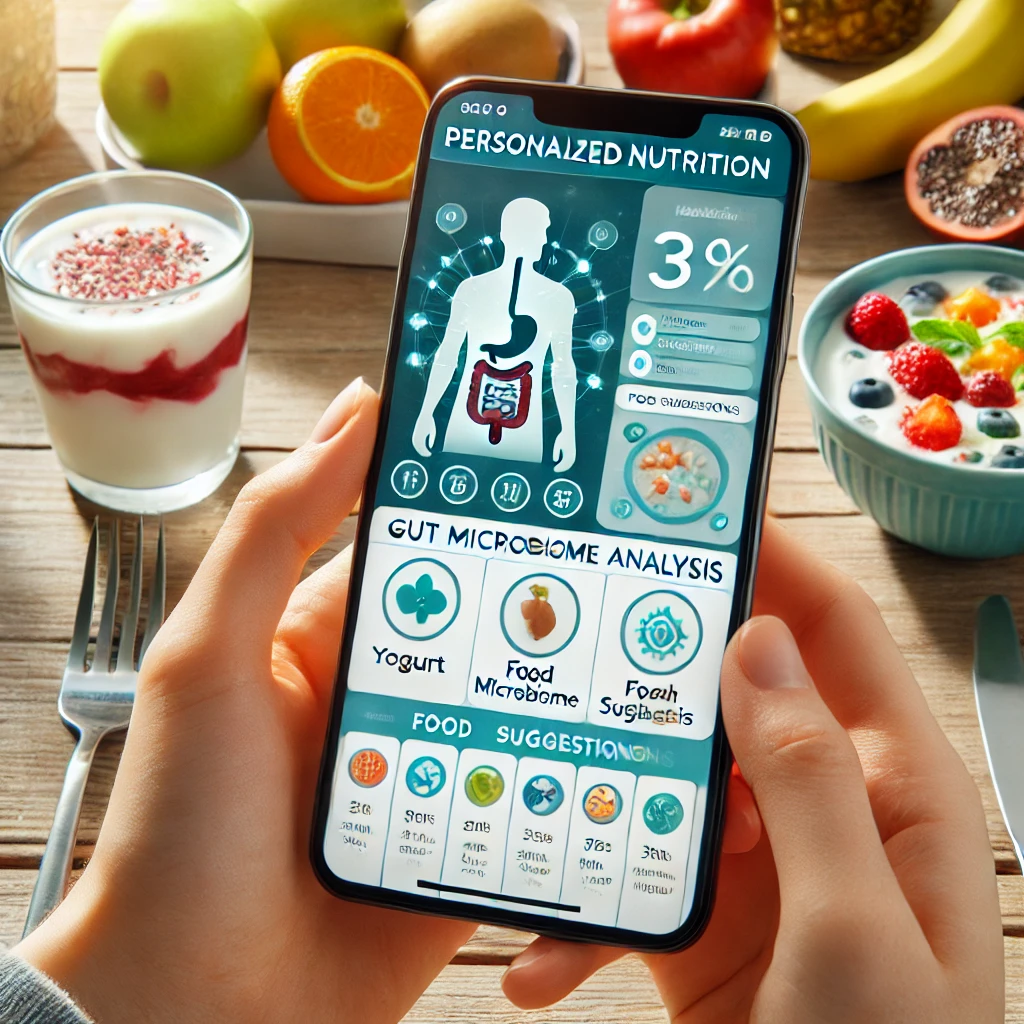
The Rise of Personalised Nutrition
In recent years, personalised nutrition has gained immense popularity among health-conscious consumers, providing tailored dietary solutions to enhance overall well-being. The global market for personalised nutrition, which Statista valued at $8.2 billion in 2020, is expected to nearly double by 2025. Consumers are increasingly seeking individualized dietary plans that consider genetics, lifestyle, and gut health to optimize their nutrition and prevent disease.
Now, researchers at Yale University’s Microbial Sciences Institute have made a significant breakthrough that could revolutionize the field, potentially transforming the way we approach food and nutrition. This research marks a critical step toward understanding how our gut bacteria respond to different foods, offering more precise insights into how we can tailor our diets to meet our unique health needs.
Understanding the Breakthrough: Gut Bacteria and Dietary Molecules
At the heart of the personalised nutrition revolution is the gut microbiome, a complex ecosystem of trillions of bacteria that live in our digestive tract. These microbes play a critical role in how we metabolize food, regulate our immune system, and maintain overall health. The recent findings from Yale University provide a new understanding of how individual gut bacteria interact with various dietary molecules, which could enable even more precise dietary recommendations in the future.
The Yale research team has created the first systematic map showing how gut bacteria metabolize food compounds differently between individuals. This is groundbreaking because, while we know that macronutrients like fiber significantly affect the gut, very little has been understood about how smaller molecular components in food impact gut health.
According to the study’s lead author, Elizabeth Culp, the variability in how gut bacteria respond to specific dietary compounds could explain why some people benefit from certain foods while others do not. For instance, one individual’s gut bacteria might flourish after consuming a particular food compound, while the same food has little to no impact on another person. This level of detail was previously unknown, and it opens the door for truly personalised dietary plans based on an individual’s gut microbiome composition.
The Implications for Personalised Nutrition
The findings from Yale’s research provide a critical foundation for understanding the vast differences in metabolic reactions between people. By pinpointing specific microbial genes responsible for how an individual’s gut microbiome responds to food, we can begin to make correlations to health outcomes such as cancer, diabetes, and gastrointestinal diseases. This paves the way for personalised nutrition strategies that go far beyond generic dietary advice.
- Tailored Dietary Plans
As researchers continue to map out how different gut bacteria metabolize dietary compounds, personalised nutrition could become even more precise. In the future, we might see personalized meal plans that cater not just to a person’s genetic makeup but also to their unique gut microbial composition. This approach would allow for better-targeted interventions for preventing chronic diseases and optimizing overall health. - Preventive Health Care
With consumer interest in gut health surging, there is a cultural shift toward preventive health care rather than simply focusing on treatment. As consumers become more aware of the link between gut health and overall well-being, the demand for personalised nutrition is expected to increase. Brands will likely continue innovating to meet this demand, incorporating technology such as artificial intelligence to provide hyper-personalized recommendations.
Consumer Understanding of Gut Health and Its Connection to Nutrition
The term “gut health” has become more mainstream in recent years, thanks in part to a growing body of research highlighting the importance of the gut microbiome. Consumers are increasingly aware that a healthy gut is linked to not just digestion but also mental health, immune function, and even skin health. The gut-brain axis, which refers to the communication between the gut and the brain, has become a focal point of scientific study and is now entering consumer conversations.
Reshma Patel, marketing manager at Yakult UK, explains the rise in consumer interest:
“While probiotics have been recognized globally for some time, it’s only recently that scientific advancements have highlighted the profound impact of gut health on overall wellbeing. It extends way beyond digestion, with growing evidence revealing the interconnection of the body’s major organs, with the gut at the center of this intricate system.”
This increased consumer understanding is driving the demand for products and services that support gut health, including probiotics, prebiotics, and personalised nutrition.
What is Personalised Nutrition?
Personalised nutrition, also referred to as precision nutrition, provides individualized dietary advice based on factors such as genetics, lifestyle, environment, and gut microbiome. Instead of offering general dietary guidelines, personalised nutrition takes a more targeted approach by considering an individual’s unique biological makeup. This allows for tailored recommendations aimed at promoting health, preventing disease, and addressing specific health concerns like diabetes or digestive disorders.
The Future of Personalised Nutrition: What’s Next?
The potential applications of personalised nutrition are vast. With Yale’s research laying the groundwork for deeper insights into how our bodies process food, we are poised to see significant advancements in how dietary recommendations are made. Here’s what we can expect in the future:
- Custom Dietary Recommendations
In the near future, we could see highly customized nutrition plans based on individual microbiomes. These plans would not only help in managing weight and improving health but also serve as preventive measures against diseases such as cancer, diabetes, and cardiovascular issues. - Technological Innovations
With artificial intelligence and machine learning gaining traction in the healthcare and wellness industries, we can expect these technologies to play a crucial role in delivering personalised nutrition at scale. AI algorithms could analyze data from wearable devices, genetic tests, and microbiome profiles to create real-time dietary recommendations that adapt to a person’s changing health needs. - Enhanced Consumer Products
The food and beverage industry is expected to continue innovating to cater to this growing market. We may soon see more functional foods and beverages specifically formulated to support gut health and tailored to individual needs, from prebiotic snacks to probiotic-infused drinks designed for specific gut profiles.
Glossary of Gut Health Terms
- Gut Microbiome: The collection of trillions of bacteria and other microorganisms living in our intestines, which play a crucial role in digestion, immunity, and overall health.
- Prebiotics: Non-digestible fibers found in foods like bananas and whole grains, which nourish beneficial bacteria in the gut.
- Probiotics: Live microorganisms, often referred to as “good” bacteria, found in foods like yogurt, that help maintain a healthy gut balance.
- Postbiotics: Byproducts produced when the body digests prebiotics and probiotics. These compounds include vitamins and peptides that support immune function and gut health.
Conclusion: The Road Ahead for Personalised Nutrition
The personalised nutrition industry is on the brink of a revolution, driven by scientific breakthroughs such as the recent research from Yale. As we learn more about the complex relationship between diet, the gut microbiome, and health, personalised nutrition is poised to become a mainstream approach to wellness. Companies that embrace this shift and invest in new technologies will likely lead the charge in offering consumers tailored solutions that address their unique health needs.
By continuing to innovate and meet growing consumer demand for personalized dietary advice, the food and beverage industry will play a pivotal role in shaping the future of health and wellness.
Sources include:
Statista – Global Personalized Nutrition Market Valuation
Source for market valuation statistics and growth projections for personalized nutrition.
URL: https://www.statista.com/statistics/1234567/personalized-nutrition-market-size/
Yale University Microbial Sciences Institute – Gut Microbiome Research
Source on the Yale University research breakthroughs related to gut microbiome and personalized nutrition.
URL: https://medicine.yale.edu/research/microbial-sciences/
National Institutes of Health (NIH) – Gut Microbiome and Health
Comprehensive information on gut microbiome and its role in health and disease prevention.
URL: https://www.nih.gov/news-events/nih-research-matters/gut-microbiome-health
Mintel – Personalized Nutrition and Market Trends
Insights from industry experts on how personalized nutrition and AI are shaping the food and beverage industry.
URL: https://www.mintel.com/blog/personalized-nutrition
Microbial Transformation of Dietary Xenobiotics – Research Study (2024)
Source for the detailed scientific study on microbial transformation and its implications for nutrition.
URL: https://doi.org/10.1016/j.cell.2024.08.038



